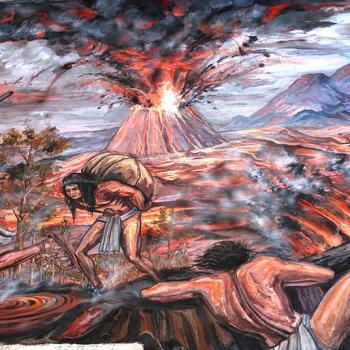
(Wikimedia Commons public domain photograph)
Two new items appeared in Interpreter: A Journal of Latter-day Saint Faith and Scholarship today. The first was written by Matthew L. Bowen:
“He Knows My Affliction: The Hill Onidah as Narrative Counterpart to the Rameumptom”
Abstract: The toponym Onidah, attested as the name of a hill in Alma 32:4, most plausibly derives from Hebrew ʿŏnî /ʿōnî/ʿônî (ʿonyî, “my affliction”) + yādaʿ/yēdaʿ (“he knew,” “he knows”) — i.e., “he has acknowledged my affliction” or “he knows my affliction.” This etymology finds support in the context of the Zoramite narrative in which it occurs. In view of the pejorative lexical associations of the Rameumptom, the “high” and “holy stand,” with Hebrew rām (< rwm, “high”) and haughtiness, arrogance, and pride, we see Mormon using the Rameumptom, the “high” platform for Zoramite self-exalting worship, with Onidah, the hill from which Alma and Amulek taught the Zoramite poor and humble. The latter name and Alma’s teaching from that location constituted a sign that the Lord “knew” their “affliction.” Alma devotes a significant part of his message not only extolling the spiritual value of their state of “affliction” and humiliation or compelled “humility” (ʿŏnî Exodus 3:7, 17), but teaching them how to “plant” the “word” (even Jesus Christ himself) in their hearts through prayer — the word that would grow up into a “perfect knowledge” of God — experientially “knowing” God (Alma 32:16‒36) and being known by him (cf. Alma 7:12).
The second was written by Brant A. Gardner:
“Labor Diligently to Write: The Ancient Making of a Modern Scripture Chapters 16 – 18”
[Editor’s Note: We are pleased to present the seventh installment from a book entitled Labor Diligently to Write: The Ancient Making of a Modern Scripture. It is being presented in serialized form as an aid to help readers prepare for the 2020 Come Follow Me course of study. This is a new approach for Interpreter, and we hope you find it helpful.]
***
Well, we’re approaching the end of the year. It’s the time — in the United States of America, anyway, for clear and sufficient tax reasons — when a lot of people make charitable contributions. If, after Christmas, you still have any money and you’ve liked anything that the Interpreter Foundation has done or is doing, please consider making a year-end donation:
“Donating to The Interpreter Foundation”
Posted from Richmond, Virginia












